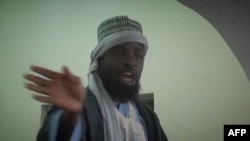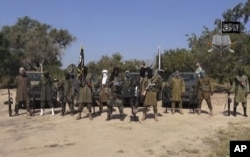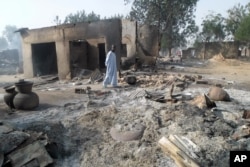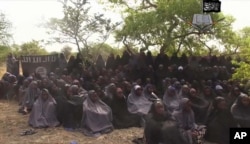This past week, a dispute over the leadership of the Nigerian-based extremist group Boko Haram unfolded in what some say is a sign the six-year insurgency may be coming to an end.
In its weekly online publication, the Islamic State militant group named Abu Musab al-Barnawi as its “governor” of ISWAP, the Islamic State’s West Africa Province, otherwise known as Boko Haram.
The group took over IS in 2014 to become the world’s deadliest terrorist group, according to the 2015 Global Terrorism Index, published by the Institute for Economics & Peace.
The article published in Islamic State’s online magazine didn’t explicitly say that al-Barnawi had replaced the bombastic preacher who has lead the group since 2009, Abubakar Shekau, but the implication is crystal clear: IS recognizes al-Barnawi as the leader of Boko Haram.
Al-Barnawi has reportedly released an audio statement attacking Shekau, according to the regional news service Sahara Reporters. In the message, al-Barnawi lambasts Shekau, accusing him of living in luxury while women and children starve.
Shekau comments
A man claiming to be Shekau responded to this so-called attempted coup with a 10-minute audio statement of his own, briefly posted on YouTube before it was taken down. In the statement, Shekau re-asserted his authority over Boko Haram and said that al-Barnawi, a longtime member of the group, is trying to stir up conflict.
“I think the [statement] by ISWAP will concern many in London and Washington that the group will increasingly turn to internationalist aims, but Shekau’s re-emergence suggests that nothing is ever straightforward,” says journalist Andrew Walker and author of Eat the Heart of the Infidel: The Harrowing of Nigeria and the Rise of Boko Haram.
That’s because the Nigerian army has announced before that Shekau was killed and replaced by another Boko Haram member who is using “Shekau” as a title. Shekau has emerged before to declare he is alive and still in control of the sect.
The man who claimed to be Shekau in this latest audio message spoke in an anxious voice tinged with frustration.
"Of course, he’s so confused and it’s a sign, he [Shekau] was showing sign of weakness,” says Khalid Aliyu, the secretary-general of Jama’atu Nasril Islam, an umbrella body of Islamic organizations in Nigeria. “I think it’s a sign of the end of the whole saga - that is one - two, it’s a sign of a defeat also. It’s also a sign of loss of power and control of the insurgency itself, therefore it shows a crack in the organization of the insurgency.”
He says Boko Haram has been overpowered by the army. In fact, Boko Haram has lost most of the territory it once held, although it still carries out attacks in northeast Nigeria and across nearby borders.
Power struggle
Aliyu speculates this may be why Islamic State is shifting the power away from Shekau in an attempt to raise the profile of Boko Haram again.
"There will be clash over leadership if it is true that Barnawi is the new leader and Shekau is saying I am still the authority, you know. There will be clashes. They will be fighting each other,” says Bulus Mungopark, a member of a Nigerian vigilante group. These groups have been key allies of the Nigerian military, helping to monitor and fight Boko Haram units.
Mungopark says he battled Boko Haram in his hometown of Chibok where Boko Haram kidnapped almost 300 schoolgirls in 2014.
However, just how far a power tussle could go depends on a couple of questionable factors, according to Walker.
“A lot depends on if Musab al-Barnawi has won over the core ideologues in the northeast. If what's reported is true and he's the son of Mohammed Yusuf that might be an advantage for him. It will also depend on how serious IS are about supporting their West African allies,” explains Walker.
Mungopark refutes rumors that al-Barnawi is the son of Boko Haram founder Mohammed Yusuf, who was killed in police custody in 2009.
"I know Mohammed Yusuf. Very well. And I know his age. So he could not have a son up to the age,” he says.
Shekau and al-Barnawi will have to win the hearts and minds of their fighters - the mujahideen, as they call themselves - but the ongoing military offensive by the regional joint task force may have affected the fighters’ morale.
Surrender, but why?
In April, the Nigerian army announced that nearly 800 sect members had surrendered. The Nigerian government has created a rehabilitation center for former jihadists.
Whether they surrendered because of fatigue or simply because they wanted to rejoin their home communities reveals an underlying sense of disenchantment with the insurgency.
“They have said no, you guys just go away we’re tired,” Aliyu says. “They are saying we have not seen anything, we have not achieved anything. If for anything we have caused havoc and devastation to our people, our own area. Therefore we tell you to hell with you.”
Furthermore, there is still no clarity on the actual level of cooperation between Islamic State and Boko Haram. The Islamic State group accepted Boko Haram's pledge of allegiance last year, shifting away from al-Qaida, but many security analysts say there does not seem to be a coordination of military strategy between the two groups.
Professor Muktar Bunza, a Nigerian historian who has followed Boko Haram, insists the so-called affiliation is nominal.
"From the beginning when Boko Haram pledged their allegiance to IS, I think both Boko Haram and IS, each one of them is looking for recognition, would want to have more followers," Bunza says.
Still, an attempt by Islamic State to reshuffle Boko Haram's leadership could point to deepening operational ties to come.







